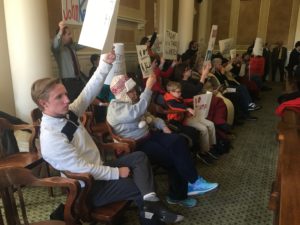
© 2016 by Steve Brawner Communications, Inc.
The campaign that began a year and a half ago finally, mercifully ended Monday in the Capitol’s Old Supreme Courtroom, when the only six Arkansans who ultimately mattered in this presidential election one by one said firmly and clearly, “Donald J. Trump.”
Those six were Arkansas’ electors who, in the previous month, had been the subjects of a campaign themselves. Keith Gibson of Fort Smith said he received 70,000 emails, along with 100 handwritten letters and about a dozen phone calls. Most were from out of state and many were just copies sent to other electors with his name inserted, and those didn’t demand much of his attention. But many were personal, emotional and sincere as they pleaded with him not to vote for Trump. Mom was right; he paid closest attention to the handwritten ones.
The campaign to change the electors’ minds occurred because, while they were pledged to Trump, they could vote for whomever they wanted regardless of that little exercise involving 1.13 million Arkansas voters Nov. 8.
Did any of it make a difference? No, but Gibson did listen.
“What I can say is that I read the letters and considered the position of those who asked me not to do that, but I don’t think I ever came to a point where I said I will not do that, I will vote for someone else,” he said. “I never reached that point.”
In the courtroom were about 40 protestors sitting quietly, many of them holding handmade signs. “Our forefathers planned for this day,” read one sign, while another encouraged the electors to vote for Ohio Governor John Kasich, who managed only 3.72 percent of the vote, including mine, in Arkansas’ May primary.
Billy Marshall of Malvern held a sign saying, “I’m sorry I voted for Trump. Save America.” He said he had voted for Trump because, “Like everybody else did, I guess, make America great.” But events since the election had changed his mind, including the involvement of the Russians and Trump’s cabinet appointments.
“What I’ve seen, he lied through his teeth,” he said. “He’s not even keeping up with what he said he was going to do.”’
The electors made their selection while sitting in the old justices’ chairs, which sit regally several feet above the rest of the courtroom. They were separated from the sign carriers by a distance of 10 yards and by a wooden railing.
The gap between what they were doing and what the sign carriers wanted them to do was much wider, but Gibson and several of the electors tried to bridge it. Prior to the vote, they approached the protestors and spoke sympathetically with Suzanne Scherer of Fayetteville, who voted for Hillary Clinton and wanted them to do the same.
“I long for the day when we can have cordial dialogue again, where both sides can participate in a meaningful debate without hating each other,” Gibson told me he said to the protestors that day.
Despite their earlier conversation, after the votes were cast for Trump and his running mate Mike Pence, Scherer said loud enough to be heard, “You voted for a facist.” “President! He’s our president!” replied a man not carrying a sign from the other side of the room. At that point, Secretary of State Mark Martin announced that anyone else who spoke out would be escorted from the room. “You voted for a homophobe,” said a woman, and she was led out by Capitol police.
This is the second time in five elections that the winner of the popular vote lost the election. We’re told that’s a non-issue because the wishes of voters in small, rural states like Arkansas were protected against the potential power of those Left Coast Californians who happen to be on the wrong side of the not-one-person-one-vote system. And if something would have happened since Nov. 8 that unquestionably called Trump’s legitimacy into question – and goodness knows what that would have to be – the electors would have served as the nation’s reserve parachute.
So six Arkansans voted for Donald J. Trump based on the wishes of 684,872 voters who cast ballots for him Nov. 8. We could do better and we could do worse, but we’re not going to do anything different any time soon. So after this long, bitter campaign, let’s try some of that cordial dialogue and meaningful debate Gibson was talking about, without hating each other.
Related: Every county is purple.
Mercifully it’s all over. We can understand the passion of the protesters because, after all, we’re heading into dangerous uncharted waters. We’ve not had a president who refused to release his tax returns, who has shown that he doesn’t have the morals of an alley cat, who erupts with endless insults whenever people don’t agree with him, who lies to us more than half the time, who has no experience in public office, who keeps showing he knows very little about key issues, who is and always will be a bully and a divider, and who has major character and personality flaws such as narcissistic personality disorder. By the way, would someone please tell him he won the election? I’ve never seen such a sore winner.
Spot on, Sandy. Let’s hope there are enough Republicans in the Congress who will put the safety and future of the country, even the world, over party.